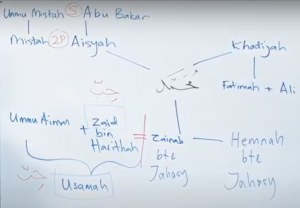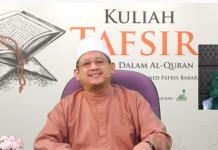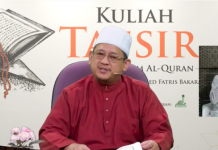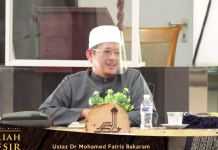بسم الله الرحمن الرحيم
Bismi-llāhi r-raḥmāni r-raḥīm
In the name of Allah, Most Gracious, Most Merciful
اللهم صلي على سيدنا محمد وعلى اله وصحبه وسلم
Allahumma salli ala Sayyidina Muhammad wa ala alihi wa sahbihi wasallim
O Allah, send your peace and blessings upon our Master Muhammad and upon his family and companions
The Stories behind Surah An-Nur (Verses 11 onwards)
This article is a summary of takeaways from Ustaz Dr Mohamed Fatris Bakaram’s Tafsir Online Lecture on 26th December 2020. Summaries of previous lectures on Surah Maryam, Surah Taha, Surah Al-Anbiya’, Surah Al-Hajj and Surah Al-Mu’minun can be found here. The summaries of the previous lectures of Surah An-Nur can be found here.
Introduction: The Battle of Banu Al-Mustaliq
In the past few lectures, we have gone through the Tafsir of verses 1 to 10 of Surah An-Nur, as well as the stories, questions, and issues linked to them. We will now move on to the next verses of this Surah. Before I begin with the tafsir of the verses, I would first like to begin with the story behind the verses.
This will provide some essential context that will later help us in understanding the interpretation of the verses. This story has two parts; the second part is linked directly to the verses of Surah An-Nur, while the first is an introduction to the second part. Today, we will listen to the first part of the story and a bit of the second part. Let us begin.
There was a time in the Life of Prophet Muhammad SAW where news came to him SAW from a land, situated between Makkah and Madinah, that was inhabited by a tribe called Banu Al-Mustaliq (some narrations name this tribe Banu Al-Mustalaq). Rasulullah SAW heard that this tribe has been collaborating with other tribes in order to form a plan to attack Rasulullah SAW and the Muslims.
Rasulullah SAW sent a few of his companions to investigate the authenticity of this news. When these companions returned, it was found to be true. So, before the Banu al-Mustaliq could launch an attack against them, Rasulullah SAW assembled his troops to head out to attack first.
The companions immediately prepared themselves for battle. It was the norm for Rasulullah SAW to bring with him one of his wives whenever he would set out for a slightly longer journey. He SAW would draw lots in order to determine which of his wives would accompany him on each journey.
To do this, he would perform Istihaam – the act of drawing an arrow from a quiver of labelled arrows, each bearing one of the wives’ names. For this battle, the name of Aisyah RA was drawn. It was Aisyah that narrated this hadith that was reported by Imam Bukhari in his book.
So Rasulullah SAW set off for battle towards Banu Al-Mustaliq, with Aisyah and his companions RA. It was recorded that along with the troops, came a group of hypocrites along with their notorious leader, Abdullah bin Ubayy bin Salul. In Surah At-Taubah, Allah SWT mentions that the presence of hypocrites within the troops does not bring any gain to the troops at all – in fact, their presence sometimes cause much disturbance.
To shorten the story, the battle ensued. It was not a tight battle because the troops of Banu Al-Mustaliq had not been prepared for battle; they had been caught off-guard by the attack by Rasulullah SAW. So, Banu Al-Mustaliq was defeated and the spoils of war distributed. Rasulullah SAW and his companions then set out to return to Madinah.
Incident One: An Argument Breaks Out
Along the way, an incident occurred that left the tribes shaken. A fight had broken out between a man from the Muhajirun (those who had migrated from Makkah) and a man from the Ansar (those who had been in Madinah originally). The Muhajir had hit the Ansar on the backside with his sword (be it accidentally or intentionally).
Now, in our Malay community, the part of the body that is most sensitive to be touched is our head. If anyone were to hit our head, we would immediately blow up in rage. For the Arabs, hitting the head was no big deal. To them, hitting the bottom is where the line is crossed. Nobody had the right to hit an Arab on his bottom.
So, the Muhajir had hit the Ansar on his bottom, and the result was a stormy argument. The Muhajir yelled out, “O fellow Muhajirun!”. The Ansar yelled out, “O fellow Ansar!”. Each man rallied his people together in the heat of anger. Chaos ensued as emotions rose and tensions built up between the Muhajirun and Ansar.
Rasulullah SAW immediately came in to de-escalate the situation. He reminded them that battling fellow Muslim brothers based on tribal loyalty was a practice of the times of ignorance. He SAW said, “How could you behave this way while I am still amongst you?”.
The people raised their voices to defend themselves, complaining against one another of such-and-such an act. Rasulullah SAW responded saying, “Leave this! Do not mention any of these to me. For verily these words are filthy!”
The word ‘Muntinah’ was commonly used to describe the state of something rotting or a nasty putrid carcass. So Rasulullah SAW stopped the believers, reminding them of their shared commitment to Allah SWT. He then ordered them to pack up and start moving.
They had in fact been at a rest stop at that point of time, night had probably fallen by then and they were ready to take a break before resuming their journey. Rasulullah SAW, however, made it clear that they were not to remain at that place any longer.
Abdullah bin Ubayy Spreads Seeds of Dissent
This decision brought up some dissatisfaction and resentment in Abdullah bin Ubayy, the leader of the hypocrites. He thought that it was not right for the Muhajirun, whom he thought of as immigrants leeching off the Ansar, to be causing such a mess and then being allowed to get away with it.
He started to spread messages inciting that these Muhajirun had become big-headed and that Rasulullah SAW was not being fair. He said to his people, “It is as though we have been conscientiously feeding a dog, and once it got big and fat, it started to eat us!”.
These were the filthy words that Abdullah bin Ubayy said to his own companions. Abdullah bin Ubayy saw the conflict as an opportunity to create discord. How is it possible that the Muhajir was at fault, and yet Rasulullah just brushed it off and closed the chapter so easily? He continued to whisper these incitements to the Ansar.
His words eventually reached Rasulullah SAW. At that moment, Sayidina Umar Al-Khattab RA, who happened to be by the side of Rasulullah SAW, heard the words of Abdullah bin Umar. Enraged, he proclaimed, “O Rasulullah, allow me to decapitate him!”. The companions of the Prophet SAW knew who Abdullah bin Ubayy was, what troubles he would commit always.
Rasulullah SAW however, stopped Umar saying, “No, do not let it be that people will say that Muhammad was someone who would kill his own followers.”. Rasulullah SAW had some insight, strategy, and wisdom. He knew the best course of action to take was not retaliation. There was a possibility that Abdullah bin Ubayy’s execution would lead to a rise in discontent amongst the Ansar.
O Rasulullah, Allow Me to Kill My Father!
So, the story of Abdullah bin Ubayy continued to spread until it reached Abdullah bin Abdillah bin Ubayy. Abdullah’s son had been named after him. And this child was amongst the most committed of the companions of Rasulullah SAW. He RA was known for his faith, sincerity, and honesty in following the commands of Allah SWT – such a huge contrast to his father.
So, Abdullah bin Ubayy’s son, upon hearing about what his father was doing, went to Rasulullah SAW. He said, “O Rasulullah, I have heard that my father had been doing such-and-such. And I got the news that you would like to kill my father.”.
Rasulullah SAW clarified saying, “I did not command his execution. That had been what Umar’s words.”. Abdullah bin Abdillah replied, “O Rasulullah, if you would like for my father to be killed, then all you need to do is to give me the order, let me be the one who kills him!”.
This son knew his father’s personality and wanted to take responsibility for it. He did not want there to be unnecessary implications if anyone else were to perform the execution. So, he volunteered himself for the act.
Rasulullah SAW did not permit it. In fact, he SAW instructed Abdullah bin Abdillah, “Birra walidak” he said, “Be good to your father”. Rasulullah SAW would not give Umar, who was not a family member of Abdullah bin Ubayy, permission to kill him.
How could Rasulullah SAW grant that permission to Abdullah bin Ubayy’s own son? Regardless of who your father may be, his deeds are between him and Allah. His misdeeds will be punished by Allah SWT justly. As a son, your role is to treat your father well.
Abdullah bin Ubayy Claims Innocence
So, the companions resumed their journey. Along the way, Abdullah bin Ubayy himself went up to Rasulullah SAW. He said, “O Rasulullah, I have been hearing rumours that I said such-and-such. O Rasulullah, I have never said such a thing! How could I do something to incite discord between the Muhajirun and Ansar?”.
Abdullah bin Salul blatantly denied what was said. Rasulullah SAW left it at that. There were no other accusers besides that single person who first mentioned it to Rasulullah SAW anyway. So, he SAW declared the case closed and moved on.
However, one can only imagine how the feelings of hatred, resentment, and dissatisfaction there must have been in the heart of Abdullah bin Ubayy bin Salul. He was so close to succeeding in creating havoc and separation between the Muhajirun and Ansar. Yet, he failed and got caught in the act. He was not going to let this incident go.
Incident Two: Aisyah Got Left Behind
A second incident followed this. As the caravan continued moving forward, carrying with them the spoils of war, their weapons, their animals and the prisoners of war, they stopped for a while to rest in the night-time. Back then, when the women used to follow on caravans, they would be given a howdah (referred to as “howdaj” in Arabic) to sit in.
A howdah was a sort of carriage that would be placed on the hump of a camel so that it gives the woman within it privacy and protection from the eyes of men. Sayidatina Aisyah travelled in a howdah on her camel. At the rest stop, her escorts had lowered the howdah onto the ground and she RA had alighted from it. She walked some distance away to get some privacy, hoping to relieve herself.
On her way back to her howdah, she noticed that a locket necklace that she had been wearing had gone missing. She made a U-turn to return to the spot where she had been to look for it. During this time, the caravans had been preparing to go off.
The men who were tasked to take care of Sayidatina Aisyah, assuming that she was in the howdah, lifted it up and replaced it back onto the camel’s back. Sayidatina Aisyah, when narrating this hadith later, mentioned that at that point of time, she was not very heavy. The absence of her weight in the howdah would not have been noticeable by the escorts.
After much searching, in the darkness of the night, Sayidatina Aisyah RA finally found the necklace. She then returned to where the caravan had been, only to find that everyone else had left without her. She must have been gone for quite some time, for they were no longer within sight.
Sayidatina Aisyah decided to stay seated where her camel had been before. She thought that someone was sure to return for her once they realised that she was gone. As she sat patiently waiting, she gradually drifted off to sleep.
Sayidatina Aisyah was Found by Safwan
Sayidatina Aisyah RA was later awakened by a male voice saying “Innalillaahi wa inna ilaihi roji’un!”. This voice belonged to a companion of Rasulullah SAW by the name of Safwan bin Al-Mu’attal. Safwan’s role within the caravan was to stay right at the back of the caravan as a ‘sweeper’ or the ‘last man’. His job was to ensure that nothing and nobody would be left behind when the caravan leaves.
Another opinion holds that Safwan was right at the back not because he had been assigned, but because he chose to be at the back and liked to take things easy. On a separate occasion, Sayidina Safwan’s wife had come to Rasulullah SAW complaining to him SAW about her husband often missing Fajr. So Safwan could have been someone who just liked taking his time.
Whatever it may be, Safwan found Sayidatina Aisyah seated waiting alone at that spot. Upon recognising who she was, Safwan had exclaimed out of shock, waking her up from her nap. Aisyah RA narrated that throughout the incident, right from the start when she had been found, all the way to the end when they were reunited with the people, Safwan did not speak a single word to her. The only thing she had heard him say was: “Inna lillahi wa inna ilaihi roji’un”.
Sayidina Sofwan had lowered his camel and then indicated to Sayidatina Aisyah to board it. After that, he led the camel, along with Sayidatina Aisyah on it, to reunite with the caravan, in silence. Only when Aisyah RA arrived on the camel did her escorts realise that she had not been with them all that while.
Abdullah bin Ubayy Strikes Again
When this story became known to Abdullah bin Ubayy, he saw the opportunity to create a bit of noise. Abdullah bin Ubayy started making some insinuations towards the two, implying that there must have been something that happened between Safwan and Aisyah. This piece of news travelled from person to person within the caravan.
When the caravan finally reached the outskirts of Madinah, Abdullah bin Abdillah bin Ubayy, who had been at the front of the caravan, stood with the other companions to welcome the people of the caravan home. When his father emerged from the caravan, Abdullah bin Abdillah drew his sword, blocking the father’s entry into Madinah. His father was surprised by this response. His son had heartily welcomed everyone else back home, yet he was firm in denying the father’s entry!
Abdullah bin Abdillah declared that he was not going to allow his father into Madinah unless by the permission of Rasulullah SAW. When Rasulullah SAW came to find them later, he SAW said, “O Abdullah bin Abdillah, let your father go”. Rasulullah SAW knew that Abdullah bin Ubayy was not the only hypocrite amongst them. He may be the chief and the loudest of the hypocrites, but he was not alone in spreading lies and inciting conflict. Rasulullah SAW let him go free.
Now that the caravan had returned to Madinah, word continued to spread about what had happened to Aisyah. “Did you hear what the Prophet’s wife did?”, “How could this have happened? She should have known better!”, “She disappeared for a while and then returned alone with a man!”.
These rumours continued to spread like wildfire across Madinah to the point that it now became known that “Aisyah, the wife of Rasulullah SAW, had cheated on her husband with a man called Safwan”. All of this began with a small thought whispered by a man with a heart of hatred towards Rasulullah SAW.
This incident became known in Islam as the Al-Ifk incident. The word “Ifk” means a deceitful lie, or slander, whose main purpose is to hurt and humiliate someone.
People Involved in the Ensuing Events
Now before I move on, I would like to introduce the main “cast members” to this story. First of all, we have the most honoured of all, Prophet Muhammad SAW whom we know to have many wives including Khadijah, Aisyah and Zainab binte Jahsyh. Khadijah RA’s youngest daughter was Fatimah, whose husband was Ali.

Figure 1: Whiteboard Illustration of the main characters of the events that will follow.
Aisyah RA was the daughter to Abu Bakar RA. Abu Bakar’s cousin was Ummu Mistah. Ummu Mistah was the mother of Mistah bin Mithaathah, who was the second cousin of Aisyah. Sayidina Mistah RA, after his father’s death in his childhood, lived in poverty with his mother. Because he was poor and a relation of Sayidina Abu Bakar, his family received a maintenance that was sponsored Abu Bakar RA.
Zainab bint Jahsyh had been married by Rasulullah SAW after she had been divorced from Zaid bin Harithah. Zaid bin Harithah had another wife called Ummu Aiman; from this marriage, they got a son called Usamah. Usamah was thus the stepson of Zainab binte Jahsyh. Zaid bin Harithah himself was someone special to Rasulullah SAW – he was once considered the adopted son of Muhammad SAW.
Zaid bin Harithah therefore was known as “Hibbun Nabiyy” (The Beloved of the Prophet), his son Usamah became known as “Al-Hibb bin Al-Hibb” (The Beloved of the Beloved). Zainab binte Jahsyh had a sister called Hemnah binte Jahsyh. Sayidina Zainab RA was known for her jealousy and was always competing with Aisyah RA. Hemnah binte Jahsyh was known as someone who would always side with Zainab in any issue that emerged.
I am aware of the time, so I should stop here for now. I will resume with this story next week, in narrating to you how the state of not only the Prophet SAW’s marriage to Aisyah, but also the harmony of the whole of the Muslim community in Madinah, was about to go to shambles.
What was the cause of this? It was the slander of false news that had been spread throughout Madinah by Abdullah ibn Ubayy. Amongst the names mentioned previously, some of them eventually became the spreaders of the false news regarding the Prophet SAW and his wife Aisyah.
Key Takeaways: Beware of Hypocrites and Stay Away from Labels
That is all for today, I hope that from the first part of this story, that you get some takeaways. Amongst the takeaways are that, in life, the believers want to be united. Believers want to stand firm in unity, love, and brotherhood. Rasulullah SAW said that the best of Ummahs, is his Ummah.
Despite this, there will always exist, even amongst the best of Ummahs, hypocrites. There will be people who will be out to cause mischief and trouble, inciting slander, fights, and misunderstandings. Even during the time of Rasulullah SAW, this problem already existed.
Therefore, in life, we need to always be cautious. This does not mean we become overly suspicious of everyone. Rather, how do we overcome treachery and cheating? This requires a bit of wisdom and intelligence.
The second takeaway is that in the incident where a fight broke out between the Muhajir and the Ansar, have a look at the vocabulary that was used. The two men rallied “their own people” together saying, ‘O Muhajirun!’ and ‘O Ansar!’. Rasulullah SAW stopped them from using these words.
These words were originally good, noble names. The name ‘Muhajirun’ was given to those who have sacrificed their lives and migrated from their homes for Islam. Was this not a beautiful and honourable status? Likewise, the name ‘Ansar’ was given to those who sacrificed all that they owned to support Rasulullah SAW and their Muslim brothers from Makkah. This was also a beautiful and honourable standing.
But Rasulullah SAW mentioned that these words could become rancid and disgusting if they were to be wrongly used. If these words were used to become fuel to incite anger, distrust, discord, and hatred, then they were no longer honourable to use.
So have a look at the words in your vocabulary. There are words that are good and honourable such as “Ahli Sunnah wal Jamaah”, “Salafi”, and “Sufi” – these are in fact noble words! The word “Sufi” is one that is good; it refers to people who follow the hadith of Rasulullah SAW, people who have hearts that are pure and noble, who are looking for the truth in the sight of Allah SWT.
There are only certain people who can be called by this name. Similarly, if someone is called a “Salafi”, it means they are scholars who have an honourable hold of the religion, they are examples for us. These are honourable names.
However, today, they are often used to label and judge people. They are used to incite disagreements. “Oh look at that, It’s the ‘Sufi’ gang!”, “Ah, it’s the Tassawuf people…”, “That is the Tarikat clan!” … We keep adding to our list of labels! What happens eventually is that we turn all these good and honourable names into labels that become the reason for us to fight amongst ourselves, to cause hatred, and mistrust.
Sometimes it goes even to the extent that people use these labels to declare a certain group of people “lost and headed to Hellfire” because they are “unlike us”. Innalillahi wa inna ilaihi rojiun.
Rasulullah SAW stopped the companions from using these honourable labels if they were going to be used for the wrong purposes. At that moment, when they were using the names to fight, they were considered despicable words to say.
This reminds me of a hadith where Rasulullah SAW said asked us to “Read the Qur’an for as long as your hearts can recite together cordially. However, when the oneness has broken and there is discord amongst you, stop reciting Qur’an together.” Rasulullah SAW told us that even in the reciting of the Qur’an together, there were limits to it. If your reciting Qur’an together will only cause hatred and disunity amongst yourselves, then do not do it.
Tell Your Brother You Love Him
Wallahu’alam… May Allah SWT eliminate every bit of hatred that lies within our hearts. May we regard one another as being part of the Ummah of Rasulullah SAW. Any mistakes made by our fellow brothers should be dealt with in kindness and wisdom.
There should not be any condemnation or mockery, that may end up causing hatred and animosity. May Allah SWT grant us barakah in our friendship and brotherhood.
This is the reason why each time we meet, I make it a point that I have to say this. There is a hadith where Rasulullah SAW said:
إِذَا أَحَبَّ الرَّجُلُ أَخَاهُ فَلْيُخْبِرْهُ أَنَّهُ يُحِبُّهُ
“When a man loves his brother, he should tell him that he loves him.” [Abu Daud]
Rasulullah SAW instructed this to us! I want us to be a community that trains itself to prioritise brotherhood and love, a community that treasures companionship that is gifted to us by Allah SWT.
So, my dear brothers and sisters, once again I want to let you know. Believe me when I tell you, with a heart full of sincerity, Allah bears witness to this. I truly, really, love you, my fellow brothers and sisters, for Allah SWT. Assalamu’alaikum warahmatullahi wa barakatuh.
Summary by: Arina Adom
Arina Adom is a lover of learning who takes on the world with an open mind. Resourceful and adaptable, always ready to take on new challenges. Comfortable working with diverse groups of people, yet able to work independently. Thrives under pressure. Currently seeking a meaningful career that enables her to impact lives directly and bring about positive changes in the lives of others in the community.
Arina graduated with a degree in Science ( Hons ), Life Science from NUS. She is currently taking a diploma in Quran and Sunnah Studies from Al Zuhri.
Watch Kuliah Tafsir again at
Masjid Darul Makmur’s Youtube
Watch and follow Kuliah Tafsir weekly
every Sunday after solat Maghrib

organised by Masjid Darul Makmur
Your contributions are appreciated. Get more details by clicking the image below.











